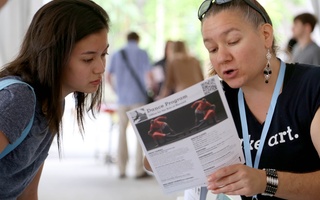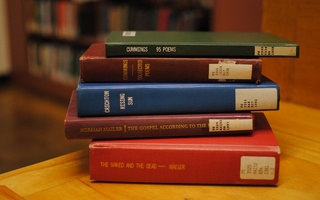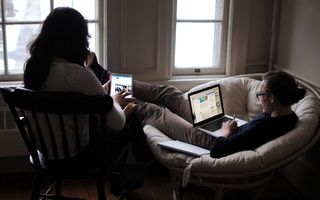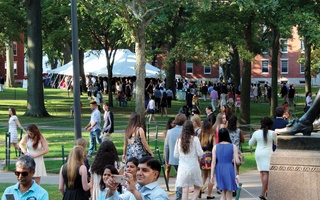Heterosexuals are the least likely sexual orientation to say that they have attended counseling: only 12 percent reported having done so. Thirty-three percent of students who identify as bisexual said they have been to counseling, as did 18 percent of those who say they are homosexual and 14 percent of those who say they are questioning their sexual orientation.
Even less likely to say they have attended counseling are those who plan to compete on Harvard’s athletic fields and courts. Eleven percent of those who identified themselves as athletic recruits said they have been to counseling, compared to just 7 percent of prospective varsity walk-ons.
LIGHTING UP
According to Freshman Dean Thomas A. Dingman '67, survey data collected by the Freshman Dean’s Office through alcohol.edu, an online alcohol prevention course completed by incoming freshmen, has found that about 70 percent of undergraduates do not identify as drinkers before arriving in Cambridge. But The Crimson’s survey indicates that members of the Class of 2017 are not strangers when it comes to booze.
Sixty percent of respondents said they have tried alcohol, and 35 percent of surveyed freshmen claimed to drink at least once a month. Sixty-four percent of men and 57 percent of women reported having had a drink. Eighteen percent of surveyed students from urban areas, and 9 percent overall, said they have a fake ID.
While 22 percent of respondents said they have tried marijuana, only a small minority reported having tried hard drugs. Less than one percent said they had tried cocaine, and less than two percent said they had done mushrooms. Less than three percent reported having tried ecstasy or molly, a colloquial term for a form of the drug. Men were slightly more likely than women to report having tried marijuana, while the two genders were just as likely to report having tried hard drugs
CONFIRMING STEREOTYPES
Harvard University has long had a reputation as a bastion of liberalism, and the survey respondents do little to buck that trend. Sixty percent identified as liberal, 25 percent called themselves moderates, and only 15 percent said they are conservative. And while 239 students described themselves as very liberal, just 33 identified as very conservative.
Along religious lines, the Class of 2017 is noticeably more divided. Thirty-two percent of respondents described themselves as either atheist or agnostic, while 42 percent identify as Catholic or Protestant and 9 percent as Jewish. Smaller percentages identify as Muslim, Hindu, Buddhist, or Mormon.
Twenty-four percent of surveyed freshmen identified as either religious or very religious, with Protestants, Muslims, and Mormons more likely to do so than their peers. Respondents who identified as Jewish were the least likely of those who reported a religion to describe themselves as religious or very religious.
PLUGGING IN
Microsoft may have roots in Cambridge, but it seems that in Harvard Yard, Apple is king. Sixty-eight percent of surveyed incoming freshmen said they own a Mac, and 70 percent said they have an iPhone.
Seventeen percent of respondents said they have Androids. All but nine percent of respondents said they have a smartphone, and only one percent of surveyed freshmen said they are entering Harvard without a cell phone.
Those from families with a higher income were significantly more likely to report owning a Mac laptop or an iPhone. Ninety-three percent of those whose parents’ total income is over $500,000 a year—the highest income bracket on The Crimson survey—have an iPhone, compared to only 55 percent of those students whose parents together make less than $40,000 a year—the lowest income bracket. Similarly, 91 percent of those in the highest income bracket reported owning Macs, compared to 47 percent of the lowest.
And like many millennials, it seems that incoming Harvard freshmen spend a lot of their time using social media. Ninety-seven percent of those surveyed said they have Facebook accounts, and 47 percent said they have Twitter accounts. Respondents reported spending significantly less time on Twitter each day than on Facebook. Among those who have Twitter accounts, the majority reported spending fewer than 15 minutes a day on Twitter, and half of those with Facebook accounts said they spend more than an hour each day on the site.
Read more in News
Students from U.S. and India Top HarvardX Registrants ListRecommended Articles
-
ALUMNI FUNA recent poll of this year's twenty-fifth reunion class shows that tennis is the most popular of all games among
-
 Freshman Survey Part I: Get To Know Harvard’s Class of 2018
Freshman Survey Part I: Get To Know Harvard’s Class of 2018 -
 Freshman Survey Part III: Inside the Classroom and Out
Freshman Survey Part III: Inside the Classroom and Out -
 Freshman Survey Part IV: Liberals, Virgins, and Facebook Fanatics
Freshman Survey Part IV: Liberals, Virgins, and Facebook Fanatics -
 Highlights from the Class of 2019 Survey
Highlights from the Class of 2019 Survey













